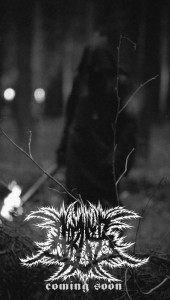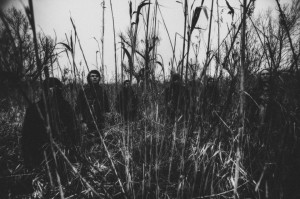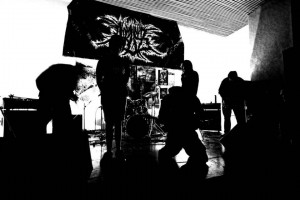 Agruss’ debut ‘Morok’ really has been one of the musical highlights of the first half of this year: Grim, bleak and oppressive but imbued with a fluid and complex nature and a maturity as frightening as it’s intent. Offered the opportunity to delve a little deeper into this Ukranian enigma, Ave Noctum asked the questions of the collective and discovered a heartfelt need to cry out against industrialization and how little hope there is when Nature decides that enough is enough.
Agruss’ debut ‘Morok’ really has been one of the musical highlights of the first half of this year: Grim, bleak and oppressive but imbued with a fluid and complex nature and a maturity as frightening as it’s intent. Offered the opportunity to delve a little deeper into this Ukranian enigma, Ave Noctum asked the questions of the collective and discovered a heartfelt need to cry out against industrialization and how little hope there is when Nature decides that enough is enough.
AN: Hello Agruss, and thank you for agreeing to do this interview. First order of the day must be to congratulate you on the quite stunning debut album Morok. It is one of the most confident and atmospheric debuts I have heard in a long time and a very mature album too.
As I had never come across your name as a band before, could you fill in a few blanks: How long has the band has been together? Have you recorded anything else like demos or splits? Also what are the musical backgrounds of the various members as you seem to bring a varied collection of genres to the table?
Agruss: Agruss was gathered into a single group at the end of 2009 by people who played completely different music, and those who first touched it. Morok is our debut and is the result of our previous work. A kind of summary of what we have learned to do from our establishment. Agruss always wanted to stay in the shadow, hiding in the depths, so we didn’t hurry with the record and its publication. Just bringing it to the end and having recorded Morok, we finally came into the world.
AN: How did you come to sign with Code666? Was the album recorded before you signed?
Agruss: This cooperation is a great pleasure for us. So we sign with Code666 when we had a completely written and ready Morok. We sent them a letter with the unmastered version of the album which they liked and they made us a proposal on which we could not refuse.
AN: You seem to have a talent as a band for really blending different kinds of metal, crust and grind into a single sound rather than separate passages of each within a song. How do you approach songwriting? Is this the result of a collective input into the songwriting or does someone always take the lead?
Agruss: In songwriting the circumstances, the views and atmosphere that we want to transfer play the important role. Each song is a separate history, separate spells that each of us first experienced in himself, but then laid out the music. Therefore the choice of style and sound is not a conscious choice of the band. Sometimes finishing a song, we are surprised of how we were able to create something like that. Maybe this is a trance or maybe approach to creativity or might be just a magic, but we think that each of our song should sound just like in Morok, and not otherwise. Mixing styles is the key and the only way to transfer the desired atmosphere, and pressure. We think we all gave the atmosphere of despair, doom and disgust of humanity.
AN: Do you get to play live much? I’m afraid most of the music I know coming out of the Ukraine is black metal so I don’t know of other bands. Is there a thriving and varied scene?
Agruss: Before the Morok release we played live very rare. Sometimes this was due to our format sounding that difficult to insert in a strictly genre concert. But in most cases, it is our own unwillingness or inability to play live.
If we take Ukrainian metal scene in general, it is weak because few groups want to create something new. Also the reason of this is underdeveloped musical infrastructure. Not all Ukrainian musicians are able to buy their own musical instruments, equipment, or record in acceptable conditions. But our respect for those groups who are in such situations and continue to create more music, and not dropping hands, see the case to the end.
Indeed outside of Ukraine all appreciate black metal that comes from it, but in Ukraine this music is not very popular. However, in the Ukrainian underground scene and DIY it is completely different. There are groups which should inspire us. Perhaps you’ve ever even heard about them.
AN: The press release for Morok makes a great deal of your specific regional background and the 1986 catastrophe at the Chernobyl nuclear power plant. Are you all from a small area and how close to Chernobyl are you?
Agruss: The city in which we live is among the three nuclear power plants, one of which is Chernobyl. Forests and wetlands of our region are affected after the accident in 1986. Thence villages are desolate, and people who lived there got Chernobyl certificates. We all spend time and all weekends in these forests, our grandparents live there, we eat products from that land. The eternal nature of that forest inspires us on thoughts which resulted in our outlook and the outlook of Agruss. Seeing the forthcoming mix of the tragedy of civilization and powerful nature we have created Morok.
AN: Are you able to explain how this event has affected your everyday lives and influenced the music? Do you feel an obligation to remind people about the fact it is an event that is really still happening?
Agruss: This event is a constant reminder that the end is not far away. That mankind has already passed the allowed limit, that we are not so intelligent and almighty as it seems to us that nature can in any moment sweep us from the earth because we are just dust against it. We are inspired by forests, marshes, desolated villages, in which dominates only nature, in which only accident brought harmony. Thoughts that arise looking and feeling this all we carry through our lifes, and its clear that we express them through our music. We do not have the intent to remind people of this disaster and its consequences over and over again; the only thing for what we yell is to express our disgust to humanity, to declare war on behalf of nature.
AN: How do you view mankind’s approach to industry and technology in general? Do you see the damage we cause as an inevitable result of industrialization or a product of greed because mankind is not grown up enough to use it carefully?
Agruss: Our music is our cry, the cry of concern about the modern world, the environment, air pollution, water and soil. It is a concern over excessive deforestation and increasing industrialization, urbanization and for which we pay a very high price … It is the cry of concern about our lives where we lost harmony with nature and extent of consumption and consequently the ability to be happy and healthy. It is a concern over excessive consumption on the one hand and the hungry, the poor on the other hand; the total cry concerning globalization and unification for corporations profit, for market expansion and placing hazardous industries there, where previously only virgin nature could be found. It is a cry of hatred for the world and local pseudo elite that darkens minds of people by means of pseudo comfort to prosper and manage the herd, which does not understand anything. They are depriving people of a chance to understand what is going on with their lives. It is a cry of hatred for those who have never experienced hunger and suffered but who gluttonously corrupt nature, create hunger and wars around the world, earning blood money from causing pain and cursing people…
 AN: The album as a whole is very dark but there seem to me to be brief flashes of hope, even though it is a very harsh and bleak hope of something like nature, a Gaia like process, slowly retaking a devastated industrial land almost as an act of revenge for the scars inflicted on it. If this is accurate, is this from observation or is it simply hope that this will happen?
AN: The album as a whole is very dark but there seem to me to be brief flashes of hope, even though it is a very harsh and bleak hope of something like nature, a Gaia like process, slowly retaking a devastated industrial land almost as an act of revenge for the scars inflicted on it. If this is accurate, is this from observation or is it simply hope that this will happen?
Agruss: Hope for our salvation is already gone. The planet could be saved but only without us. We should die out. Only a deserted planet can live quietly and peacefully, as thousands of years ago. The melody shows the romance of self fatality. No reason for optimism. While you’re waiting for the end of the world, you have not noticed that you already live in a hell created by your own hands. We look forward with great hope that it will end, that the planet will destroy us as shallow parasites. We lost the opportunity to co-exist harmoniously with nature. Nature will destroy those who destroyed her confidence. We are close to such aesthetics, this is Morok…
AN: The final three tracks of the album are grouped together under the title of Under The Snow. What separates these songs from the rest of the album? Can you expand on the themes you explored and how they fit into the proposed trilogy mentioned in the press release.
Agruss: All songs on the album in the order they are show the whole story in Ukrainian about Morok. Therefore, the three parts of Under the Snow describe last stage of Morok, namely the inevitable death of all and its glorification. The first part is conversation with the forest, with its mature trees, and the restitution of life and body to the forest, as an excuse for everything mankind have done. The second part is the description of the burial all around with the eternal snow, whose veil will hide everything that will remain from us. And the third part the most ritual and occult, is the prayer, the spell, requests for higher powers, the text of which we have decided to hide. These three parts is the apogee of Morok, and end of all time, curse for us, and salvation for nature.
AN: Are you going to be able to gig across Europe in support of Morok?
Agruss: If we will have such proposals we are happy to respond them, and carry out our rituals elsewhere outside of Ukraine. We are working on it.
AN: Thanks again for your time and I hope that Morok gets the interest it really deserves.
Agruss: Mutual thanks for your attention, support and nice words about Morok. Be with nature…
You owe it to yourselves to listen when Agruss are crying out.
http://www.myspace.com/agrusshate
http://www.facebook.com/AgrussOfficial
Interview by Gizmo

Leave a Reply